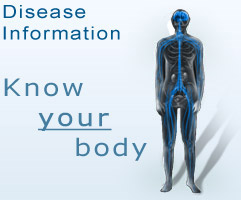Lung cancer
Lung cancer is the most common form of cancer among both men and women. It has a strong link to cigarette smoking and, to a lesser degree, exposure to asbestos. The frequency with which the condition occurs, however, seems to be rising in women and stabilising in men.
There are various categories of lung cancer. They are broadly categorised as small cell and non-small cell lung cancer. This distinction has implications for the natural development of cancer, the type of treatment indicated and the expected outcome.
Because the early symptoms of the condition are not necessarily specific to lung cancer, patients are often not diagnosed until later. Symptoms that should alert patients include coughing up blood, increasing shortness of breath, persistent cough or a change in the nature of a chronic cough, hoarseness and chest pain. General symptoms include weight loss and tiredness. Patients may also have secondary symptoms due to the spreading of the condition to other parts of the body.
To establish a diagnosis and to determine the extent of the condition, the following investigations are useful:
- chest X-ray
- an examination of the inside of the lungs using a thin, flexible instrument called a bronchoscope (bronchoscopy); cells can also be removed from suspicious areas in the lung by using a biopsy needle (called needle aspiration); sometimes more invasive procedures are necessary to obtain a definite diagnosis
- sputum (mucus and other matter brought up from the lungs by coughing) specimens to check for cancer cells and infections
- computed tomography (CT) scan of the chest
- ultrasound or CT scan of the upper abdomen
- radioisotope scans to check whether the cancer has spread to the bones
- blood tests to check blood counts in preparation for chemotherapy, as well as to check for the spread of the disease to other organs.
Your doctor may require further investigation depending on your symptoms at the time of the tests.
Treatment options
Treatment will depend on the nature and extent of the condition, as well as on your general state of health.
Non-small cell cancer
Treatment options include surgery, chemotherapy, radiotherapy and various combinations of these treatment methods in various sequences. The choice of therapy will be determined by the stage of the condition,
co-existing medical disorders (e.g. emphysema, diabetes or heart problems) and general wellbeing. The different treatment options will be explained and discussed with you.
Small cell lung cancer
Chemotherapy plays a crucial role in the treatment of small cell lung cancer. Often the treatment options mentioned above may be used in addition, depending on the stage of the disease, the patient's general condition and his or her preference. Unfortunately patients initially respond very well to chemotherapy, but eventually develop resistance to the treatment. At this point, treatment becomes aimed more at relieving symptoms and improving general health and quality of life.
References
GVI Oncology (South Africa). Website: http://www.cancercare.co.za
UpToDate Patient Information. Lung Cancer. Website: http://www.uptodate.com/home/index.html
 TransmedBanner4.jpg)

